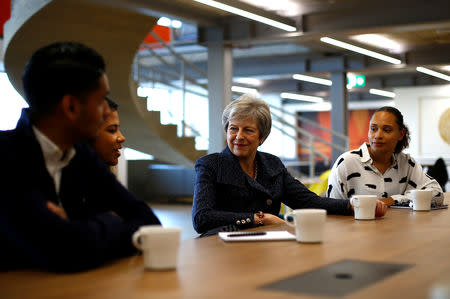Brexit negotiators eye Monday breakthrough, Northern Irish party ups the ante
By Amanda Ferguson and Gabriela Baczynska
LONDON/BRUSSELS (Reuters) - British and EU negotiators making headway on the Irish border hope for a Brexit deal breakthrough on Monday, diplomats said, though the British prime minister's Northern Ireland ally has stoked uncertainty by warning it could vote against her.
Under pressure from all sides, Theresa May told journalists at Downing Street reception that talks on the key issue of the Irish border were likely to continue until November, while cabinet ministers who met with May on Thursday evening were cited by the Financial Times as saying the border issue was close to being settled.
However, the Brexit spokesman of the Democratic Unionist Party (DUP), May's parliamentary partner, said the DUP's 10 members of parliament would vote against the UK budget and consider voting no-confidence in May if the British government breaks the DUP's red lines in Brexit talks.
"In breaking her promises she would be agreeing to break up the United Kingdom," Sammy Wilson said.
Asked about the threat, May said: "The DUP will do what the DUP will do."
The DUP vehemently opposes any checks between Northern Ireland and mainland Britain after Brexit, which is due in March and would be the United Kingdom's biggest trade and foreign policy shift for more than four decades.
But at the same time, neither side wants to upset peace on the island of Ireland by winding down the open border between the British province there and EU member state Ireland. That will become the only land border between the UK and the bloc.
EU Brexit negotiator Michel Barnier on Wednesday rammed home that - while the bloc was looking at ways to carry out checks on many goods away from the actual frontier - animal and animal products would have to be screened on the border.
May has said she wants "frictionless" trade with the EU after Brexit to help safeguard Britain's economy while regaining full sovereignty. Her spokeswoman said on Thursday London would present further proposals, which she described as "regulatory aspects", for the backstop border arrangement "in due course".
"HEADWAY"
Agreeing on how to maintain an open Irish border after Brexit is the key hurdle now to sealing a divorce deal between the EU and Britain. While London wants to regulate that by a future trade deal with the EU, the bloc insists on an emergency fix in case negotiating new relations takes longer, or fails.
Both sides have made positive signals in recent days though also indicated they were still short of a deal, which would define the divorce terms and include an EU declaration stating that it would seek the closest possible ties with Britain after Brexit ranging from trade to security to research.
"We are not there yet. There is no breakthrough - yet," Margaritis Schinas, chief spokesman for the EU's executive European Commission, told a news briefing on Thursday.
Still, diplomatic sources on both sides of the talks told Reuters that "it was going well" and that Brexit negotiators locked away in Brussels this week were "making headway" specifically on the Irish issue.
They said tentative planning could see a breakthrough announced on Monday when EU negotiators representing the bloc's national leaders meet in Brussels without Britain. Britain's Brexit minister, Dominic Raab, could also come to Brussels then if weekend talks cover enough ground.
Just six months before Britain is due to leave the EU, some other British officials have voiced more caution, saying "big issues" still lie in the way of any agreement.
The 27 states remaining in the bloc hope to announce "decisive progress" in divorce talks at an EU summit next week and then finalise their offer of close future ties with Britain next month.
PRESSURE ON MAY
As that departure date creeps closer, pressure on May from various directions is intensifying.
After meetings in Brussels earlier this week, the DUP issued a series of terse warnings to May over the compromise that is in the making between the EU and British negotiators.
"She will not have DUP support regardless of whether the government tries to bribe, bully or browbeat us into accepting it," Wilson also said.
By withdrawing its support, the DUP could make it difficult for May to pass legislation through parliament, including the budget which will be voted on later this month.
In May's own Conservative party, some eurosceptic lawmakers want to vote against her approach to exiting the EU as it would not bring a sharp enough break from the bloc in their view.
The parliamentary arithmetic is difficult for May who commands a majority of only 13 lawmakers including the DUP. She needs to keep either her own party onside or attract votes from the main opposition Labour Party.
Labour demands that Britain retain "the exact same" perks it now has within the EU's customs union and single market - something May's so-called Chequers plan does not meet and which the EU rules out since London decided to leave both.
Former Labour leader Tony Blair added his voice to calls to vote down any Brexit deal by May, hoping that would open the way for another referendum in which Britons would this time decide to stay, after their popular vote in June 2016 that resulted in a narrow "Leave" victory.
(Additional reporting by Guy Faulconbridge, Andrew MacAskill and Elizabeth Piper in London, Alastair Macdonald in Brussels; Writing by Gabriela Baczynska, Editing by Elisabeth O'Leary and Mark Heinrich)



